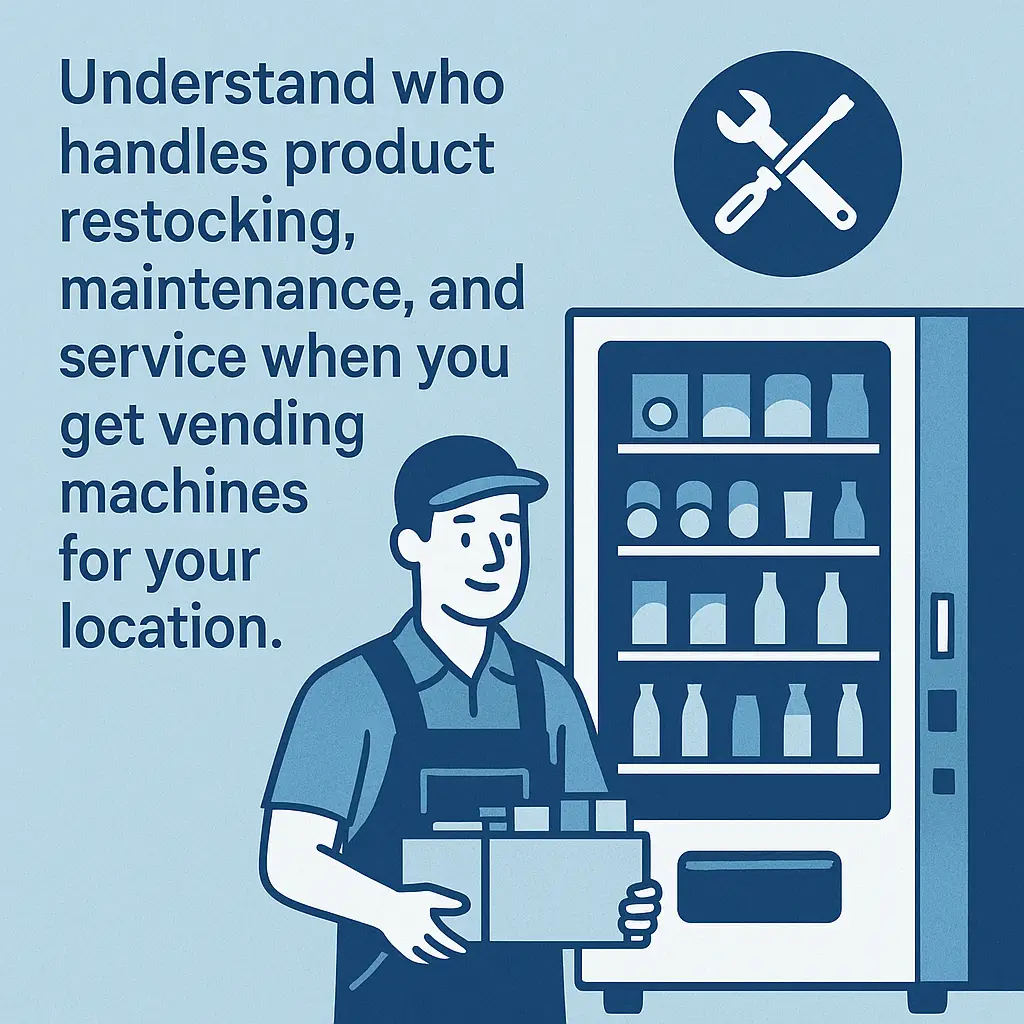Who Fills and Restocks Vending Machines?
Understand who handles product restocking, maintenance, and service when you get vending machines for your location.
Back to Vending Info for Businesses ResourcesUnderstand who handles product restocking, maintenance, and service when you get vending machines for your location.
Back to Vending Info for Businesses ResourcesOnce your vending machines are installed, trained local vendors handle the restocking, product management, and machine maintenance. Restocking frequency is based on foot traffic and demand, with most machines refilled weekly or biweekly for peak performance.
![]() Restocking frequency depends on location size and traffic
Restocking frequency depends on location size and traffic
![]() Vendors monitor inventory using smart remote systems
Vendors monitor inventory using smart remote systems
![]() Service schedules ensure functioning and stocked machines
Service schedules ensure functioning and stocked machines

After a vending machine is installed at your location, the responsibility for restocking and maintenance usually falls on the vending operator servicing that account. These are local vendors who either own or manage the machines placed in businesses such as offices, schools, or apartment complexes. They regularly visit to refill inventory and check that everything is functioning properly.
Most vending machines today are equipped with telemetry systems that notify operators when stock runs low or a malfunction occurs. This allows vendors to schedule restocking trips more efficiently and react quickly to service issues. In high-traffic areas, vending machines may be refilled multiple times a week, while lower-traffic locations could be serviced biweekly or monthly.
Managed vending agreements—an option offered through services like Vending Exchange—go a step further. These contracts include performance standards, ensuring machines are always clean, stocked, and in working order. Some even include financial penalties if the vendor fails to meet those expectations, giving you peace of mind and better reliability.
Typical restocking items include snacks, drinks, and shelf-stable meals. Many vending companies adjust product choices based on what's selling at your location. For projects like school vending setups or workplace vending, vendors will also consider health requirements and employee preferences.
If your current vendor doesn’t keep machines stocked or frequently delays service, it may be time to switch. Unused machines not only disappoint employees or tenants—they can reflect poorly on your business. Services like Vending Exchange help match you with professionals who commit to consistent restocking and responsive maintenance, typically completing setup within 7 days.
Machine types like AI coolers and micro markets provide smart inventory tracking so items are replenished based on real-time usage. Planning to serve a high-volume facility? You might also want to explore large-scale vending solutions tailored for warehouses or logistics hubs.
If you're exploring vending options for your business, Vending Exchange can help simplify the process. Delivery, Installation and Equipment is provided at no cost to you - vendors provide the machines, keep them stocked, and handle all servicing. Whether you need a provider or full-service management, just fill out the form on this page to get started.
The vending operator assigned to the location handles all restocking, cleaning, and product rotation.
Restocking typically takes place weekly or biweekly depending on foot traffic and usage.
Most vending operators provide maintenance and repairs as part of their service, often within 48 hours.
Yes, vendors often tailor product selection based on preferences, dietary needs, and sales data.
Modern machines use telemetry to alert vendors when items are low or issues occur.
If your machine is often unstocked, it may be time to switch to a more reliable provider.
Some vendors offer managed service agreements with performance obligations and product guarantees.
Yes, most vendors accommodate product requests based on volume and availability.
No, vending operators handle all inventory, restocking, and vending machine upkeep.
Telemetry systems report sales data and service needs to vendors and in some cases, account holders.